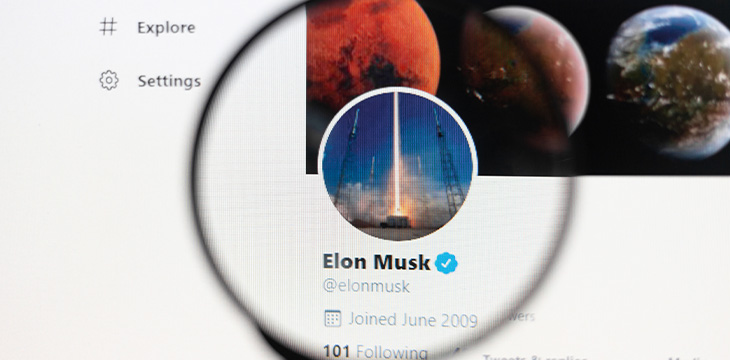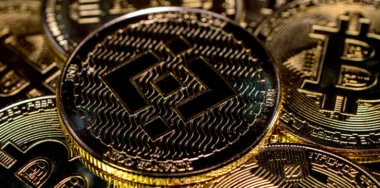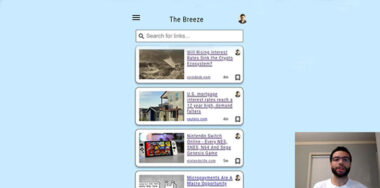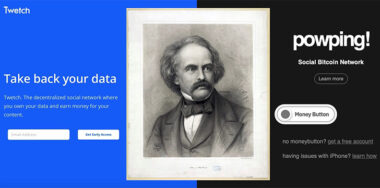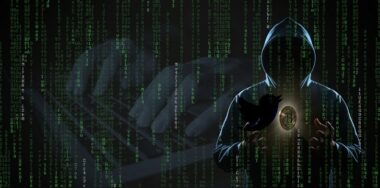| Getting your Trinity Audio player ready... |
Elon Musk has completed his purchase of the Twitter (NASDAQ: TWTR) social network, with financing help from one of the ‘crypto’ sector’s most controversial figures.
Late Thursday, numerous media outlets began reporting that Musk’s $44 billion acquisition of Twitter was a done deal, beating the court-ordered deadline of getting things done by October 28 at 5 p.m. EST. In a typically cheeky move, Musk changed his official Twitter bio to ‘Chief Twit’ and later tweeted, “the bird is freed.”
Multiple outlets also reported that Musk’s first action as owner was to sack CEO Parag Agrawal, CFO Ned Segal, general counsel Sean Edgett, and legal affairs/policy chief Vijaya Gadde. Reuters sources claimed the erstwhile execs—whom Musk had previously accused of lying about the scale of Twitter’s ‘bot’ problem—were unceremoniously ‘escorted’ out of Twitter’s San Francisco HQ the moment the deal was done.
The New York Stock Exchange announced Friday that Twitter will be officially delisted on November 8, which will complete the company’s transition from public to a private company. Musk previously suggested that he could take Twitter public again in “3-5 years,” presumably after he’s remolded the platform to his own specifications.
Earlier Thursday, Musk tweeted a statement directed at Twitter’s advertisers, apparently seeking to downplay concerns over his previous self-identification as a “free speech absolutist,” which led some to conclude that he views any level of content moderation as censorship. Musk said Thursday that Twitter “obviously cannot become a free-for-all hellscape, where anything can be said with no consequences!”
Declaring that “low relevancy ads are spam,” Musk said it was “essential to show Twitter users advertising that is as relevant as possible to their needs.” Under Musk’s leadership, Twitter “aspires to be the most respected advertising platform in the world that strengthens your brand and your enterprise.” (Yeah, good luck with that.)
Nobody knows anything
There’s no shortage of speculation as to what a Musk-led Twitter means for the digital asset sector, but Dogecoin fans appear to believe that Musk’s historical fondness for the token portends great things. Doge fans are salivating at the possibility that Musk might make Doge the default currency of his rumored ‘everything app’ that could bear more than a passing resemblance to China’s WeChat. The fiat value of Doge rose steadily all week as it became clearer that the deal would get done, and at one point Friday stood nearly 50% higher than a week ago.
Musk briefly became the BTC camp’s brightest star by padding Tesla’s balance sheet with $1.5 billion worth of the function-free tokens. But Musk dashed the moon-boys’ hearts this July when he revealed that Tesla had “converted” 75% of its BTC back into fiat. Musk went on to dismiss cryptocurrency as “a sideshow to the sideshow” and “not something [Tesla] think about a lot.”
Text messages released as part of the discovery phase of Musk’s efforts to wriggle out of his Twitter deal show an equally schizoid delight/disdain re blockchain technology. In the space of 10 days, Musk went from proposing a “blockchain social media system that does both payments and short messages” to declaring “Blockchain Twitter isn’t possible.” (Actually, Elon, it’s demonstrably possible, provided you build it on a scalable chain with ultra-low transaction fees.)
While speculation will run wild over the next few weeks/months, the truth is that no one knows what Musk plans to do with his new toy. The mercurial Musk himself probably has no concrete plan on what to do, given his tendency to pinball between diametrically opposed viewpoints faster than a Tesla on autopilot casually veers into oncoming traffic.
Enter the Zhao
There is one ‘crypto’ luminary who may benefit most from Musk’s Twitter buy. In May, not long after Musk first floated the idea of buying Twitter, Changpeng’ CZ’ Zhao, the controversial founder of Binance, the world’s largest cryptocurrency exchange by volume, confirmed that he’d offered Musk a ‘blank check’ worth some $500 million as part of the external financing portion of Musk’s bid.
Given the torturous path Musk took to Thursday’s acquisition, CZ could well have been forgiven if he’d thought better of honoring that check. But earlier this week, Bloomberg quoted CZ saying, “I think so,” when queried as to whether he was still supporting Musk’s bid.
Late Thursday, CZ tweeted that “our intern says we wired the $500 million 2 days ago, probably just as I was being asked about Elon/Twitter.” This implies that CZ was either being disingenuous with his ‘I think so’ audience, or he’s just that clueless as to what ‘interns’ get up to at Binance. (Then again, CZ could be trying to establish a precedent that might allow him to evade prison by blaming rampant illegality on rogue staffers. Worth a shot.)
That $500 million reportedly makes Binance the fourth-largest contributor to Musk’s external financing package. CZ later issued a formal statement saying Binance was “excited to be able to help Elon realize a new vision for Twitter.” Binance hopes to “play a role in bringing social media and Web3 together in order to broaden the use and adoption of crypto and blockchain technology.”
CZ has a common cause with Musk re Twitter’s bot problem, as CZ is one of the most popular figures for impersonation by Twitter scammers. Every tweet of CZ’s is almost immediately replied to by a small army of accounts looking to ensnare his followers in this or that crypto grift. (And that’s Binance’s job, dammit!)
Anecdotal reports from some high-profile members of the Twitterati on Friday suggest there’s already been a marked reduction in crypto bot activity. If so, CZ may have already got his money’s worth. But he’ll get even more if he somehow convinces Musk that Binance’s in-house BNB token would look good on a Binance Chain-based Twitter.
Not so strange bedfellows
There are plenty of non-crypto concerns stemming from Musk’s deal. One of the individuals Musk fired Thursday—policy chief Gadde—had been tasked by former Twitter CEO/co-founder Jack Dorsey with deciding how to handle sketchy behavior by high-profile accounts. That included Donald Trump, who was famously ‘de-platformed’ following the January 6 attack on the U.S. Capitol.
Musk, who reportedly plans to assume the CEO mantle himself—at least, until a permanent toady can be identified—is also reportedly planning to reverse all ‘lifetime’ bans from the platform, theoretically offering a path back to Twitter for Trump. (Kanye ‘Ye’ West is already back on Twitter after his account was locked earlier this month due to antisemitic tweets.)
(Late Friday, Elon tweeted that Ye’s account was “restored by Twitter before the acquisition” without consulting with Musk. Musk added that “Twitter will be forming a content moderation council with widely diverse viewpoints. No major content decisions or account reinstatements will happen before that council convenes.”)
When Elon originally announced his takeover bid, Trump claimed he wouldn’t come back, insisting he would stick with his struggling Truth Social platform. Trump issued a statement Friday expressing his happiness that Twitter “is now in sane hands” but bragged (as usual, without evidence) that Truth Social “had bigger numbers than all other platforms, including TikTok, Twitter, Facebook and the rest.” Oh, Donny…always overcompensating.
Given Musk’s previous comments and historic proximity and ideological affiliation with Peter Thiel—another member of the so-called ‘Paypal Mafia’ who doesn’t believe democracy is compatible with ‘freedom’—left-leaning Twitter users may have ample reason to fear what Musk’s tenure would mean. But Musk’s reported plan to fire 75% of Twitter staff—which he’s since (somewhat) walked back—alarmed individuals (regardless of their political leanings) who thought Twitter was already struggling to adequately moderate content.
As part of Thursday night’s overture to advertisers, Musk said he didn’t buy Twitter “because it would be easy” or “to make more money.” No, Musk drastically overpaid for Twitter “to try to help humanity, whom I love.” From all external evidence, Musk is indeed human, and his self-love is all too evident. But love for other humans? That depends.
In early October, Musk told the Financial Times that Taiwan should knuckle under and accept China’s “reasonably palatable” dominion over its affairs, graciously acknowledging that this arrangement “won’t make everyone happy.” One week later, China granted Tesla significant tax breaks on two of its electric vehicles. So yeah, Musk loves humanity, but he’s more than willing to promote human subjugation if it might boost his bottom line.
We’ll leave you with this disturbing thought: given (a) the fact that the privately-held Twitter is now largely insulated from regulatory oversight and (b) Musk’s tendency to equate all actions that are good for him as good for humanity, should you be reviewing your DMs before Musk decides to do the same?
Elon, approaching the DM archives: pic.twitter.com/RpekgZPqpc
— Jacob Silverman (@SilvermanJacob) October 26, 2022
Watch: The BSV Global Blockchain Convention panel, Re-Inventing Business with Blockchain
New to blockchain? Check out CoinGeek’s Blockchain for Beginners section, the ultimate resource guide to learn more about blockchain technology.

